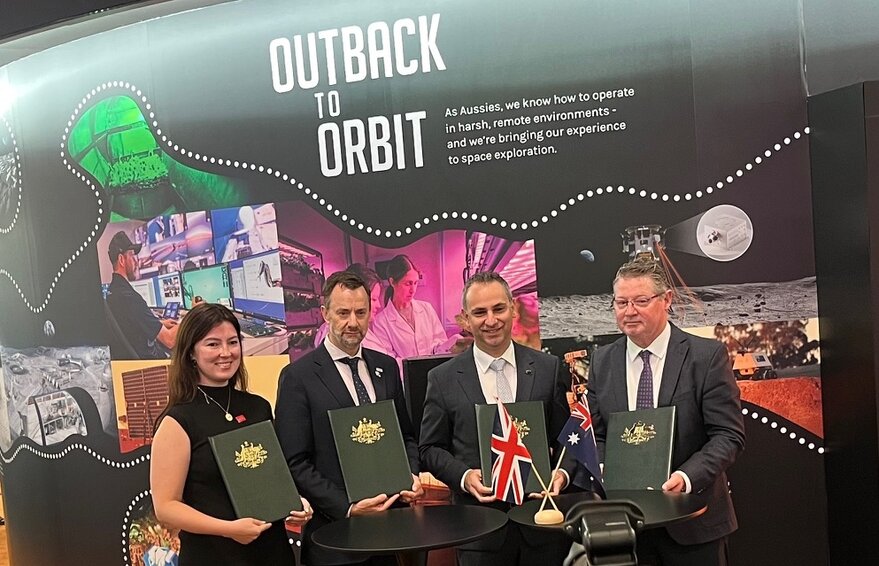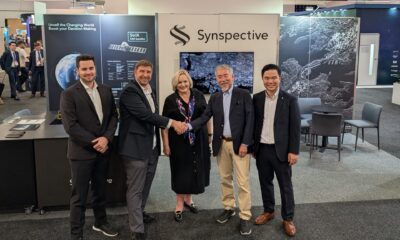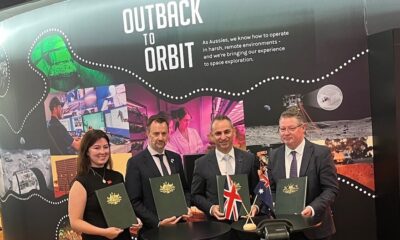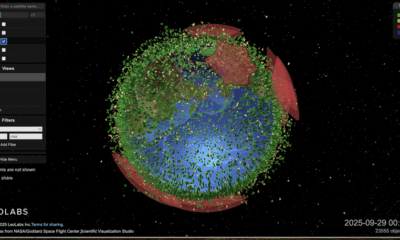Technology
Australia and UK Strengthen Space Partnership with New Agreement

Australia and the United Kingdom have reaffirmed their commitment to enhancing space cooperation through a renewed agreement signed on October 1, 2023, during the International Astronautical Congress held in Sydney. The heads of the respective space agencies, Enrico Palermo from the Australian Space Agency and Paul Bate from the UK Space Agency, re-signed the Space Bridge Framework Arrangement, a partnership originally established in 2021 aimed at fostering investment, research, and collaboration in the space sector.
Bate emphasized the role of government in facilitating partnerships between companies and academic institutions in both nations. “Companies and academic groups in Australia and in the UK want to collaborate, but the government can make those collaborations easier and provide some funding when it comes to the research and development side,” he stated in an interview with SpaceNews.
Key Initiatives Under the Space Bridge
The Space Bridge initiative has already made significant strides in promoting regulatory cooperation between Australia and the UK. Palermo noted the importance of harmonizing efforts as both countries develop their spaceflight ecosystems. “How can we harmonize? How can we share lessons learned? That’s been another part of the Space Bridge,” he added.
One notable project under this partnership is AquaWatch, which focuses on monitoring water quality through both space and ground-based technologies. This initiative involves collaboration among several organizations, including Surrey Satellite Technology Ltd., Pixalytics Ltd., Assimila Ltd., the University of Stirling, RAL Space, CSIRO (Australia’s national science agency), and Deloitte Australia. The AquaWatch project has been awarded £479,000 (approximately $644,142) to integrate satellite data with in-situ water measurements.
AquaWatch is part of a broader initiative funded by the UK Space Agency’s International Bilateral Fund, which supports collaborative projects between UK and international partners. On September 30, 2023, the fund announced that it would provide a total of £6.5 million to 23 projects across various countries, including Australia, Canada, France, Germany, India, Japan, Lithuania, and the United States.
Additional Projects and Funding
Another key project, the Long Baseline Multistatic Radar for Deep Space Domain Awareness, brings together the University of Birmingham, Goonhilly Earth Station, the University of Manchester, CSIRO, and the Massachusetts Institute of Technology Lincoln Laboratory. This initiative has received £452,000 to develop capabilities for detecting and tracking small objects in geostationary orbit.
Furthermore, the Satellite Applications Catapult Ltd., Space Machines, and the University of Sydney have been awarded £447,000 to explore liquid fuel movement within spacecraft and its impact on stability and pointing. Space Machines is also collaborating with Lunasa Ltd. to advance technologies for autonomous rendezvous and proximity operations, which will integrate Lunasa’s autonomous StarLogic RPO kit into the GEO-Viper inspection satellite, funded with £392,000.
This renewed partnership between Australia and the UK signifies a strong commitment to advancing space exploration and technology. As both nations continue to collaborate, they aim to leverage their respective strengths to create a more integrated and efficient space ecosystem.
-

 Science2 weeks ago
Science2 weeks agoNostradamus’ 2026 Predictions: Star Death and Dark Events Loom
-

 Technology1 month ago
Technology1 month agoOpenAI to Implement Age Verification for ChatGPT by December 2025
-

 Technology6 months ago
Technology6 months agoDiscover the Top 10 Calorie Counting Apps of 2025
-

 Health4 months ago
Health4 months agoBella Hadid Shares Health Update After Treatment for Lyme Disease
-

 Health4 months ago
Health4 months agoAnalysts Project Stronger Growth for Apple’s iPhone 17 Lineup
-

 Health4 months ago
Health4 months agoErin Bates Shares Recovery Update Following Sepsis Complications
-

 Technology4 months ago
Technology4 months agoElectric Moto Influencer Surronster Arrested in Tijuana
-

 Technology5 months ago
Technology5 months agoDiscover How to Reverse Image Search Using ChatGPT Effortlessly
-

 Technology6 months ago
Technology6 months agoMeta Initiates $60B AI Data Center Expansion, Starting in Ohio
-

 Technology6 months ago
Technology6 months agoRecovering a Suspended TikTok Account: A Step-by-Step Guide
-

 Education4 months ago
Education4 months agoHarvard Secures Court Victory Over Federal Funding Cuts
-

 Technology2 months ago
Technology2 months agoDiscover 2025’s Top GPUs for Exceptional 4K Gaming Performance





















